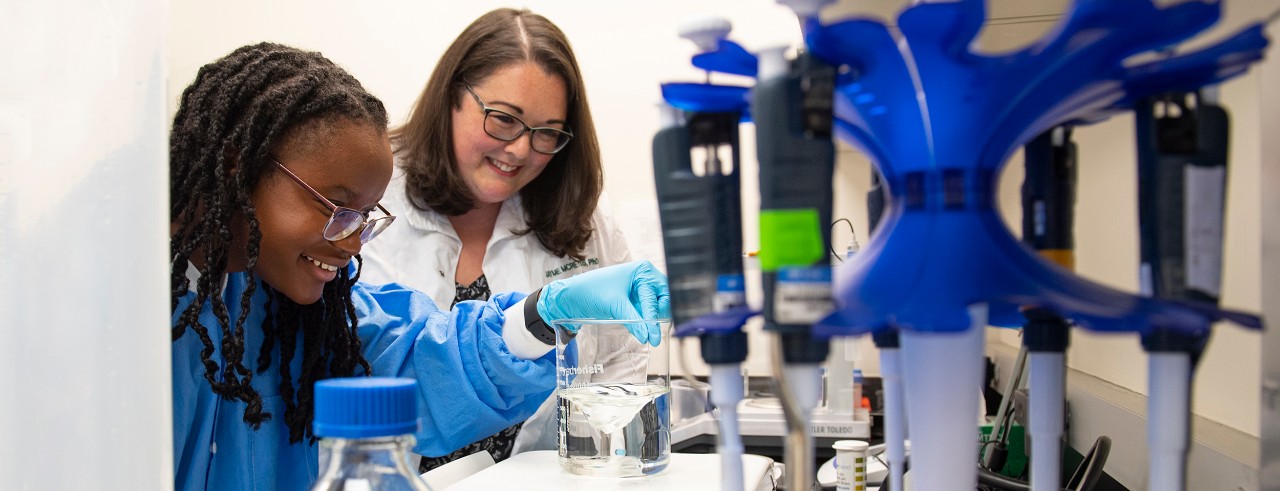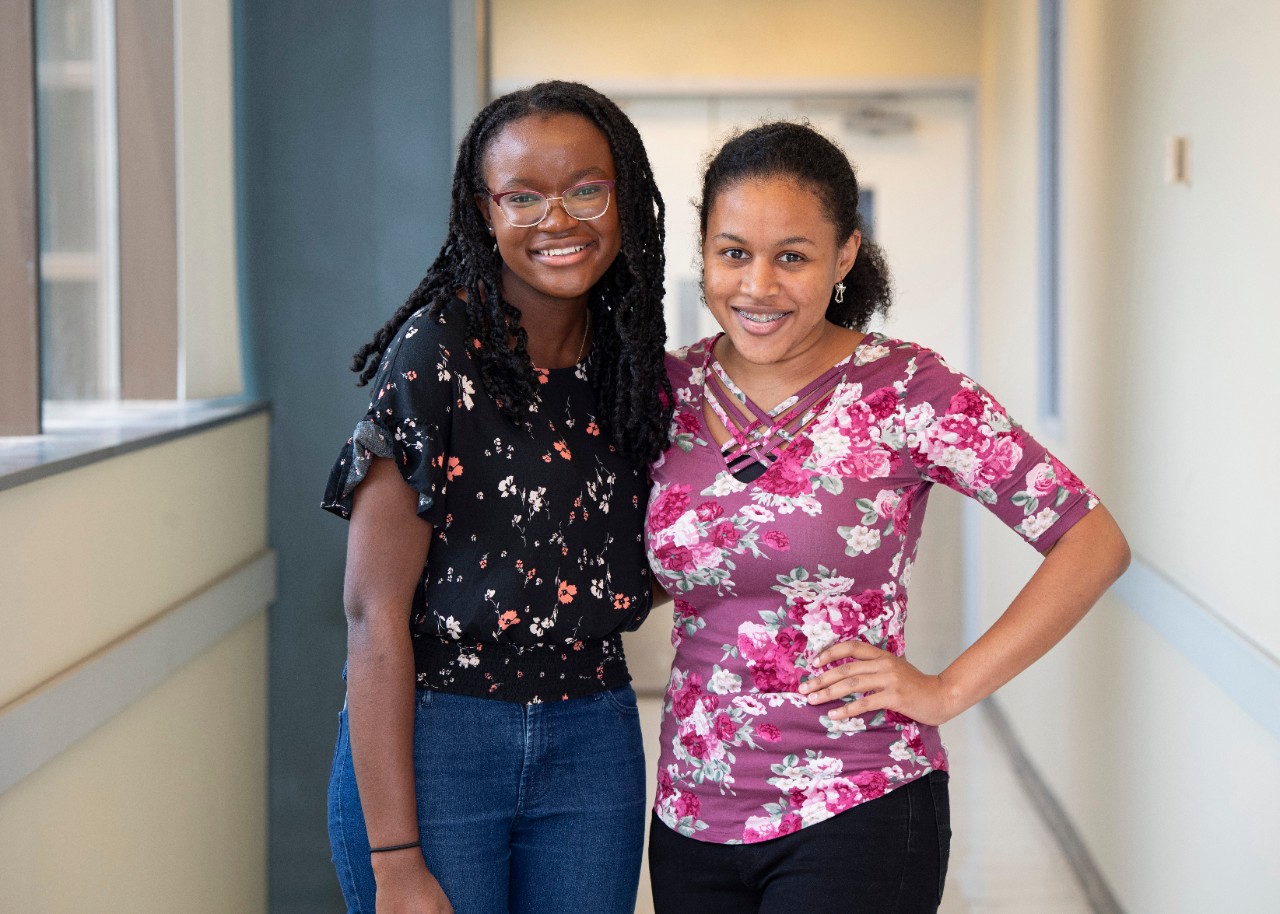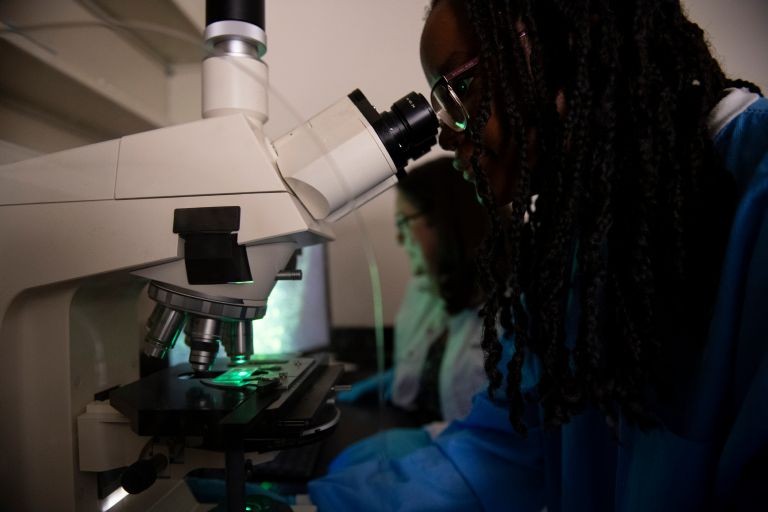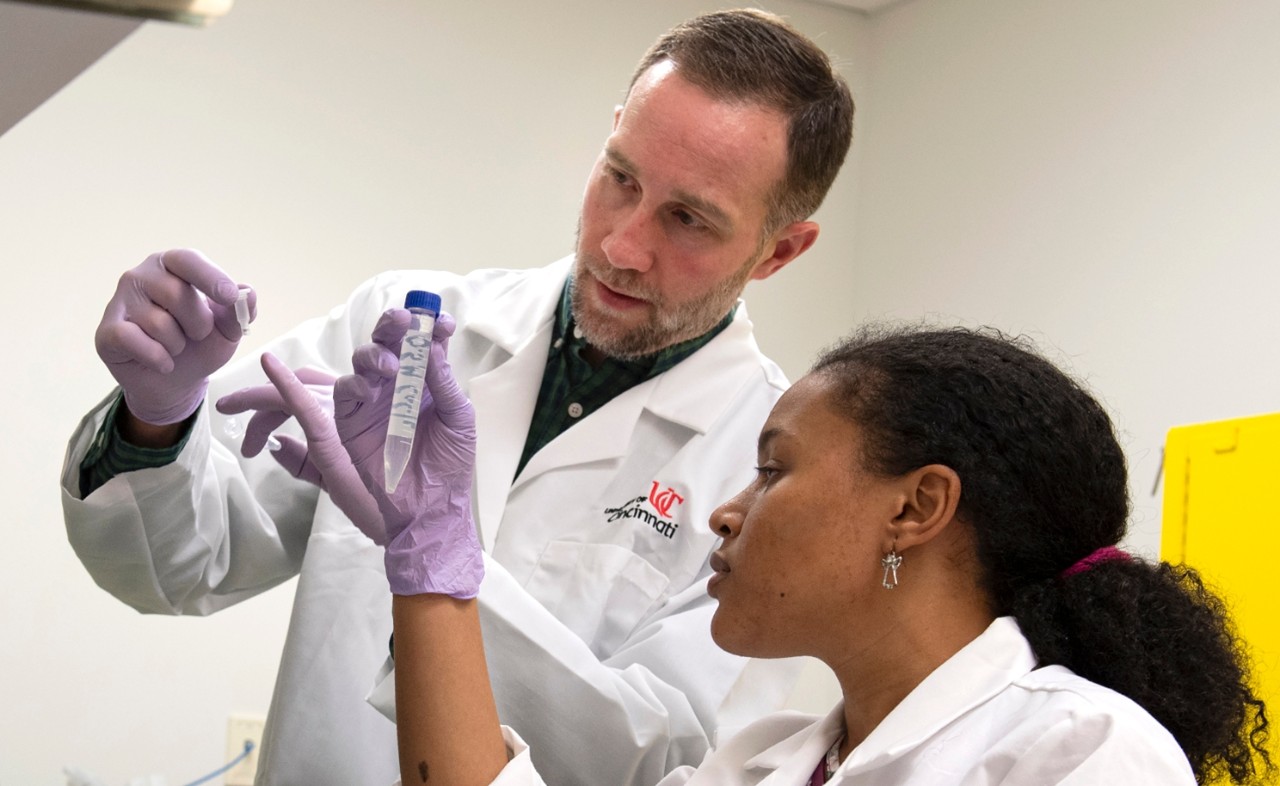
NIH grant gives underrepresented students insight into the neurosciences at UC
Students from across the country look at UC neuroscience research in action
“What I did on my summer vacation” is a common essay prompt that often elicits a response of fun-filled adventures with family and friends and perhaps a sprinkling of sand and surf.
However, if Gabrielle Allen and Christina Singh, undergraduate students visiting UC, were to write their summer essay, it would be about a knowledge-filled adventure with complete strangers, in the landlocked city of Cincinnati.
That’s because Allen, a third-year student at the University of Georgia, and Singh, a fourth-year student at St. Edward’s University in Texas, spent 10 weeks at the University of Cincinnati this summer interning in neuroscience laboratories as participants in UC’s new program, called RISE UP or Research Innovation in NeuroScience Education for Underserved Populations.

Christina Singh (right) and Gabrielle Allen spent their summer interning in UC's Department of Pharmacology and Systems Physiology on UC’s Reading campus. Photo/Kelley/UC Creative + Brand.
The program, funded by the National Institutes of Health (NIH), provides underrepresented undergraduates from across the country the opportunity to come to Cincinnati and be mentored by top researchers in the neurosciences — at either the University of Cincinnati or at Cincinnati Children’s Hospital Medical Center.
“The goal is to have them stay in the neuroscience pipeline, but ultimately we want to attract them to UC,” says the program’s co-director Matia Solomon, an associate professor in UC’s Department of Psychology. Solomon, and co-director Teresa M. Reyes, a professor in the Department of Pharmacology and Systems Physiology, say they applied for the grant based on the success of another program: UC’s SURF (Summer Undergraduate Research Fellowship) neuroscience program, which is funded internally and is also geared toward attracting undergraduate students to continue study at UC in the STEM (science, technology, engineering and mathematics) fields.
“In both programs [RISE-UP and SURF-Neuro) the core components are an intensive research experience coupled with professional development workshops,” says Reyes, noting that students intern in neuroscience labs studying diseases of the brain, such as Alzheimer’s, epilepsy and depression.
We’ve been so fortunate to have the enthusiastic participation of the mentors. We couldn’t do it without them. It’s a community effort.
Teresa Reyes Co-director of the RISE UP program and UC professor
The new $528,000, five-year, RISE UP grant covers all the expenses for approximately 10 students per year, from underrepresented populations, disadvantaged students or first-generation college attendees. Additionally, outside of the lab, students attend medical science lectures given by UC faculty and life skills workshops and have opportunities to explore the city. “Students from these backgrounds don’t tend to stay in the STEM disciplines, so hopefully this exposure piques their interest to continue,” says Solomon.
“We’ve been so fortunate to have the enthusiastic participation of the mentors. We couldn’t do it without them. It’s a community effort,” says Reyes. The bulk of the research training falls to the primary lab mentors, who introduce students to lab procedures, research methodology and analysis.

Allen and McReynolds working in a dimmed room while imaging for fluorescent markers. The room is darkened to minimize bleaching the signal Photo/Kelley/UC Creative + Brand.
“It was such a welcoming environment,” says student Allen, who was mentored by Jayme McReynolds, a UC assistant professor in the Department of Pharmacology and Systems Physiology on UC’s Reading campus. Here, Allen worked under McReynolds’ guidance, conducting research pertaining to the influence of stress and drug-seeking behavior. “I was amazed by a lot of things, but mostly how everyone had such amazing problem-solving skills and how they handle themselves under pressure, and I think that’s translational,” says Allen.
McReynolds, who joined the UC faculty in 2019, is a veteran at bringing undergraduates under her wing and into the research lab. She’s mentored over 50 undergraduates, “basically since I was a lab technician myself” and considers teaching “one of the most rewarding aspects of my job.”

St. Edward’s University undergraduate Christina Singh in the lab with mentor Eric Wohleb, a UC neurosciences researcher who studies how immune cells shape brain function.
It’s a sentiment echoed by Singh’s mentor, assistant professor Eric Wohleb, whose lab in the same department studies how immune cells shape brain function. Singh, he says, spent 40 hours a week in the lab and was laser-focused on her tasks and assignments. The benefit of having students in the lab, he says, is that they see things from a different perspective. “We spend a lot of time around experts, and [Singh] asked questions that we don’t really think about since we’re in the thick of it every day,” he says, noting there was an added benefit of “her contagious enthusiasm.”
With a Bachelor of Science Degree in behavioral neuroscience from St. Edward’s on the horizon, Singh says, “UC is definitely on my radar now,” as a place to earn her doctoral degree.
“It has opened my eyes a lot and opened up my options as well,” says Singh.
Featured image at top of Gabrielle Allen with her mentor Jayme McReynolds. Photo/Colleen Kelley/UC Creative + Brand
Impact Lives Here
The University of Cincinnati is leading public urban universities into a new era of innovation and impact. Our faculty, staff and students are saving lives, changing outcomes and bending the future in our city's direction. Next Lives Here.
Related Stories
UC researcher launches app to connect patients to lifesaving...
May 7, 2025
A cardiologist and researcher at UC’s College of Medicine joined the Venture Lab at the 1819 Innovation Hub to launch High Enroll, an app that links clinical trials with willing participants.
UC students destigmatize stress in nursing
May 7, 2025
UC nurse anesthesia graduate students lead a research-based effort to address stress and burnout in nursing, coping strategies, and the importance of mindfulness and peer support.
UC, UC Health see frontline student training as workforce...
May 6, 2025
Amid ongoing challenges across the health care workforce, including burnout and shortages, the University of Cincinnati is working to tackle this issue through a program that embeds students in clinical settings.
